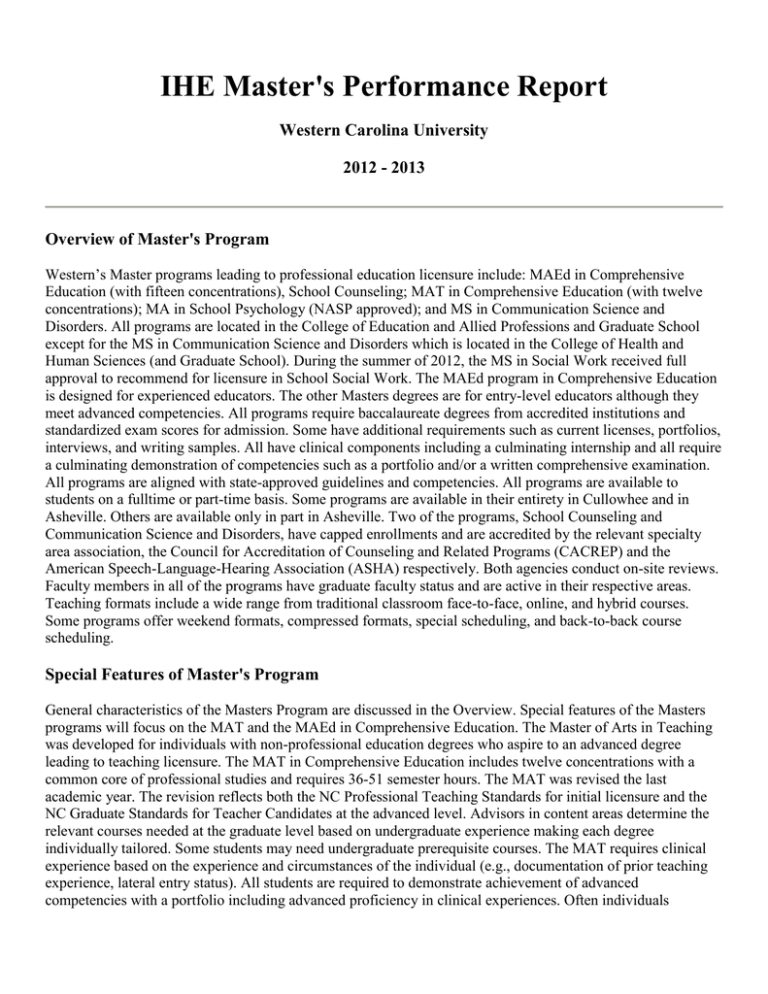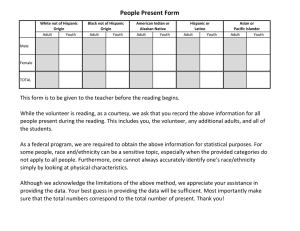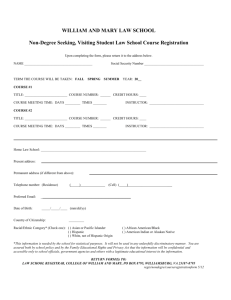IHE Master's Performance Report Western Carolina University 2012 - 2013
advertisement

IHE Master's Performance Report Western Carolina University 2012 - 2013 Overview of Master's Program Western’s Master programs leading to professional education licensure include: MAEd in Comprehensive Education (with fifteen concentrations), School Counseling; MAT in Comprehensive Education (with twelve concentrations); MA in School Psychology (NASP approved); and MS in Communication Science and Disorders. All programs are located in the College of Education and Allied Professions and Graduate School except for the MS in Communication Science and Disorders which is located in the College of Health and Human Sciences (and Graduate School). During the summer of 2012, the MS in Social Work received full approval to recommend for licensure in School Social Work. The MAEd program in Comprehensive Education is designed for experienced educators. The other Masters degrees are for entry-level educators although they meet advanced competencies. All programs require baccalaureate degrees from accredited institutions and standardized exam scores for admission. Some have additional requirements such as current licenses, portfolios, interviews, and writing samples. All have clinical components including a culminating internship and all require a culminating demonstration of competencies such as a portfolio and/or a written comprehensive examination. All programs are aligned with state-approved guidelines and competencies. All programs are available to students on a fulltime or part-time basis. Some programs are available in their entirety in Cullowhee and in Asheville. Others are available only in part in Asheville. Two of the programs, School Counseling and Communication Science and Disorders, have capped enrollments and are accredited by the relevant specialty area association, the Council for Accreditation of Counseling and Related Programs (CACREP) and the American Speech-Language-Hearing Association (ASHA) respectively. Both agencies conduct on-site reviews. Faculty members in all of the programs have graduate faculty status and are active in their respective areas. Teaching formats include a wide range from traditional classroom face-to-face, online, and hybrid courses. Some programs offer weekend formats, compressed formats, special scheduling, and back-to-back course scheduling. Special Features of Master's Program General characteristics of the Masters Program are discussed in the Overview. Special features of the Masters programs will focus on the MAT and the MAEd in Comprehensive Education. The Master of Arts in Teaching was developed for individuals with non-professional education degrees who aspire to an advanced degree leading to teaching licensure. The MAT in Comprehensive Education includes twelve concentrations with a common core of professional studies and requires 36-51 semester hours. The MAT was revised the last academic year. The revision reflects both the NC Professional Teaching Standards for initial licensure and the NC Graduate Standards for Teacher Candidates at the advanced level. Advisors in content areas determine the relevant courses needed at the graduate level based on undergraduate experience making each degree individually tailored. Some students may need undergraduate prerequisite courses. The MAT requires clinical experience based on the experience and circumstances of the individual (e.g., documentation of prior teaching experience, lateral entry status). All students are required to demonstrate achievement of advanced competencies with a portfolio including advanced proficiency in clinical experiences. Often individuals participating in the alternative licensure program pursue the MAT. The MAT in Special Education is now completely online and several concentrations are moving towards more online courses. The Master of Arts in Education in Comprehensive Education is undergoing a complete restructuring. The program faculty have met throughout the year and plan to offer most/all of the program online. During program prioritization on Western’s campus, the MAEd was placed in category three, mainly due to decreasing enrollment. This ranking requires a comprehensive action plan to be completed during the summer of 2013. The restructuring efforts and plan will be complete by the end of summer. The MAEd program was originally built upon the core propositions of the National Board for Professional Teaching Standards and designed to lead to National Board Certification. Currently, and was later revised to reflect the new NC Graduate Standards for Teacher Candidates. The current MAEd in Comprehensive Education shares a common core with courses in assessment, diversity/differentiation, leadership and research. Technology is a common thread throughout the program goals. Eleven concentrations are offered, including elementary education, art, health and physical education, English, social sciences, chemistry, biology, mathematics, English as a Second Language, and special education (with emphases in adaptive or general curriculum). We have already begun to plan for changes to both the common core and options for concentrations. Two certificate programs now exist, in lieu of an MAT program, that lead to initial licensure in middle grades education and music education. Mathematics Education is also considering dropping the MAT in favor of a certificate program. II. CHARACTERISTICS OF STUDENTS A. Headcount of students formally admitted to and enrolled in programs leading to licensure. Full Time Male Graduate Female American Indian/Alaskan Native American Indian/Alaskan Native 3 Asian/Pacific Islander Asian/Pacific Islander 1 Black, Not Hispanic Origin 1 Black, Not Hispanic Origin Hispanic Hispanic White, Not Hispanic Origin Licensure-Only 1 23 White, Not Hispanic Origin Other Other Total American Indian/Alaskan Native 24 108 2 Total American Indian/Alaskan Native Asian/Pacific Islander Asian/Pacific Islander Black, Not Hispanic Origin Black, Not Hispanic Origin Hispanic Hispanic White, Not Hispanic Origin White, Not Hispanic Origin Other Other Total 1 Total 116 1 1 Part Time Male Graduate American Indian/Alaskan Native American Indian/Alaskan Native 2 Asian/Pacific Islander Asian/Pacific Islander 2 Black, Not Hispanic Origin 2 Black, Not Hispanic Origin 4 Hispanic 1 Hispanic 1 White, Not Hispanic Origin 34 White, Not Hispanic Origin Other 2 Other Total Licensure-Only Female 39 3 Total American Indian/Alaskan Native American Indian/Alaskan Native Asian/Pacific Islander Asian/Pacific Islander Black, Not Hispanic Origin Black, Not Hispanic Origin Hispanic Hispanic White, Not Hispanic Origin White, Not Hispanic Origin Other Other Total 160 Total 172 4 4 B. Lateral Entry/Provisionally Licensed Teachers Refers to individuals employed by public schools on lateral entry or provisional licenses. Program Area Number of Issued Program of Study Leading to Licensure Number Enrolled in One or More Courses Leading to Licensure Prekindergarten (B-K) Elementary (K-6) Middle Grades (6-9) Secondary (9-12) Special Subject Areas (K-12) Exceptional Children (K-12) Vocational Education (K-12) Special Service Personnel (K-12) 2 Other Total Comment or Explanation: 2 C. Quality of students admitted to programs during report year. Masters MEAN GPA N/A MEAN MAT New Rubric 392 MEAN MAT Traditional N/A MEAN GRE New Rubric 297 MEAN GRE Traditional 1,002 MEAN NUMBER OF YEARS TEACHING EXPERIENCE N/A NUMBER EMPLOYED IN NC SCHOOLS N/A * To protect confidentiality of student records, mean scores based on fewer than five test takers were not printed. Comment or Explanation D. Program Completers (reported by IHE). Program Area Graduate Graduate Licensure Only PC Completed program but has not applied for or is not eligible to apply for a license PC LC PC LC Elementary (K-6) 1 6 Middle Grades (6-9) 6 5 Secondary (9-12) 2 9 Special Subject Areas (K-12) 3 14 Exceptional Children (K-12) 8 34 2 Special Service Personnel 43 16 2 Total Comment or Explanation: 63 84 5 LC Completed program and applied for license Prekindergarten (B-K) 1 Vocational Education (7-12) E. Scores of program completers on professional and content area examinations. 2011 - 2012 Program Completers Licensure Pass Rate Specialty Area/Professional Knowledge Number Taking Test Percent Passing Counselor 8 100 Spec Ed: Adapted Curriculum 1 * Spec Ed: BED 1 * Spec Ed: General Curriculum 3 * Institution Summary 13 92 * To protect confidentiality of student records, pass rates based on fewer than five test takers were not printed. F. Time from admission into professional education program until program completion. Full Time 3 or fewer semesters 4 5 6 7 8 semesters semesters semesters semesters semesters MastersUpgrade/Add-0n 3 3 0 0 0 0 Masters-First Awarded 0 3 4 1 0 1 G Licensure Only 1 0 0 0 0 0 Part Time 3 or fewer semesters 4 5 6 7 8 semesters semesters semesters semesters semesters MastersUpgrade/Add-0n 8 10 18 7 8 18 Masters-First Awarded 0 2 2 3 0 2 G Licensure Only 3 0 1 0 0 0 Comment or Explanation: G. Satisfaction of program completers/employers with the program in general and with specific aspects of the program, as rated on a 1 (lowest) to 4 (highest) scale. Due to several factors affecting survey responses, survey results will not be reported at the institutional level this year.




